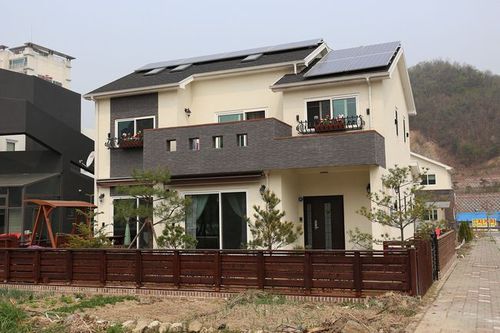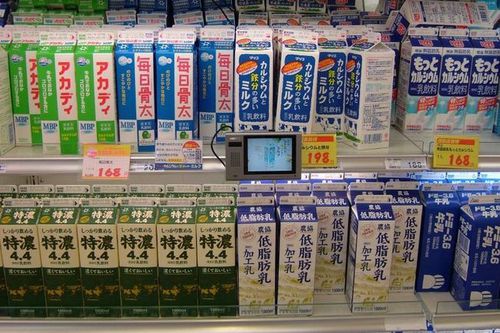Thank you to subscribers who responded to our May 23 announcement on revisions to our private policy and confirmed their wish to continue receiving e-mail from JFS.
The new European Union General Data Protection Regulation that entered into force on May 25, 2018 applies to EU residents.
JFS will continue delivering JFS Weekly and monthly newsletters to EU subscribers who confirmed their wish to "continue reading JFS," and to non-EU residents.
You can change your mind at any time by clicking here or by writing to info@japanfs.org.
Thank you for reading sustainability information from Japan via JFS!
TEPCO to Test New Service to Temporarily "Keep" Surplus Power from Residential Solar Panels

Image by jwco.
A trial for a unique new service to virtually "keep" surplus power temporarily from residential solar panels is starting soon in Japan. It is hoped that the service will make it possible for households to use surplus power from their own solar panels even if they don't have storage batteries.
Japan introduced a feed-in tariff (FIT) scheme several years ago requiring major utilities to pay specified rates to purchase electricity "fed in" to the grid from small producers of renewable energy. The electricity buy-back period for some households will end starting in 2019. In preparation for this situation, there has been much discussion about how to utilize the surplus electricity generated by households that have installed photovoltaic systems, including the use of storage batteries, after the current FIT scheme ends.
In advance of the 2019 issue, TEPCO Energy Partner, Inc. (Toden EP) announced the launch of testing for a new service to "keep" (temporarily store) surplus power from household solar power generation systems. Even houses that have no storage batteries will be able to benefit from this service to make efficient use of their surplus power.
The test is part of the "Next Generation Smart Town Project" conducted through collaboration between Toden EP and Toyota WoodYou Home Co. (Ustunomiya City, Tochigi Prefecture). The project will test this new service focusing on energy and IoT (the Internet of Things) for single-family homes in large developments by residential developer Toyota WoodYou Home, with the aim of eventually commercializing the service. They plan to conduct the verification test on a total of 552 lots in three developments in Tochigi Prefecture.
As part of the project's "Power Keeping Service" (tentative name) households that have installed photovoltaic panels will provide data on their power consumption and generation (for selling) to Toden EP. Analyzing the data, Toden EP will keep track of "unconsumed" surplus power from households and will be deemed to be "keeping" it temporarily. The company will then "return" the power to households when they consume electricity and allow it to be shared with other households. With this service, the aim is to make effective use of surplus power even in households that don't have storage batteries. The trial will test the system design and fee structure.
The trial is planned to run from July 2018 to March 2019, and during this time, smart home devices and special electricity rate plans will be tested.
Source: Smart Japan (in Japanese)$B!!(B
Tokyo, NTT Docomo Conduct Trial of Food Loss Reduction Program

Image by Toby Oxborrow Some Rights Reserved.
The Tokyo Metropolitan Government and NTT Docomo announced on January 15, 2018, that they would conduct a demonstration trial of EcoBuy at a grocery store called mini Piago in Irifune 1-chome, Chuo City, Tokyo. The trial was carried out for 41 days from January 19 to February 28, 2018, as part of a model business series focusing on the sustainable utilization of resources. The joint project aims to raise awareness about food loss reduction among consumers and encourage shops and houses to reduce food waste.
EcoBuy is an app for smartphones, developed by NTT Docomo. It is designed to reduce food loss by giving incentives in the form of points to consumers for purchasing foods designated as EcoBuy products due to the proximity of best-before dates or expiration dates.
The consumers take photos of the receipt and the best-before or expiration dates on products and send the photos to a point-handling center through the app. Upon receiving the photos, the center checks the photo data and awards points, such as "d points" issued by NTT Docomo, worth about 20 percent of the listed price if the purchased food meets the conditions.
During the trial period, the center sent reminders to consumers when the remaining time before the registered expiration dates reaches a certain time. If the food had already been consumed, a "thank you" message was sent to the consumers. If not, the center sent recommended recipes suitable for the purchased food to encourage consumption of the food.
Japan for Sustainability (JFS) is a non-profit communication platform to
disseminate environmental information from Japan to the world. We are
grateful that people in 191 countries have found an interest in our free
e-mail publications, and will continue to do our best to deliver useful
information to our readers all around the globe.
Please feel free to forward this message to your colleagues and friends
wherever the Internet can reach. If you know colleagues or friends there
with an interest in sustainability, please do forward them one of our
newsletters and invite them to try our service. To subscribe for JFS
Newsletters, visit www.japanfs.org/en/newsletter/subscribe.html

If you find our information and activities unique and valuable,
we appreciate your support!
http://www.japanfs.org/en/join/donation.html

Use this form http://www.japanfs.org/acmailer/unsubscribe.html to
remove your email address from our mailing list.

We welcome your comments. Please send them to: info@japanfs.org

Japan for Sustainability (JFS)
 |  |  |
Copyright (c) 2018, Japan for Sustainability. All Rights Reserved.

